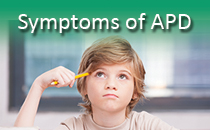Are listening or focus problems affecting your teenager's learning?
In teenagers, due to the changing academic demands of higher grades, earlier symptoms or complaints may reappear. Without an accurate diagnosis, older children may not have received meaningful and appropriate accommodations to help them cope with Auditory Processing Disorder. Some children end up experiencing deteriorating motivation and develop low self-esteem along the way. Adolescents with learning deficits are at greater risk for emotional and behavioral problems if they do not have adequate support systems and develop appropriate coping skills. An APD diagnosis can help ensure that these children receive appropriate management strategies to be successful in school. For example, since some types of Auditory Processing Disorder affect the ability to pull information together efficiently and to sequence, plan, and organize responses, some children may qualify for untimed tests, extended time for projects/assignments, and additional time during standardized tests.
Lecture & Note-Taking Challenges
- Problems understanding concepts presented in lecture-based classes because of difficulty with note-taking
- Poor grades in foreign-language classes because of the new speech sounds and vocabulary that must be learned
- Difficulty with timed tests presented in multiple-choice or short-answer format, including college entrance exams
- Difficulty with certain teacher styles or accents
Language, Memory & Processing Speed
- Difficulty following sequential instructions
- Trouble paying attention for appropriate periods, such as during a class lecture
- Difficulty comprehending reading assignments
- Difficulty remembering a list or sequence
- Often needing words or sentences repeated
- Poor ability to memorize information learned by listening
- Interpreting words too literally
Motivation, Fatigue & Social Impact
- Difficulty in classes in which they had excelled previously
- Lack of motivation to learn as academic demands increase
- Becoming mentally fatigued more easily than peers
- Difficulty hearing clearly in noisy environments
- Talking louder than necessary
- May avoid group discussions or social interactions that require focused listening
- Increased stress or frustration during complex verbal tasks
Check for Auditory Processing Symptoms
The Buffalo Model Questionnaire-Revised (BMQ-R) is a quick, confidential online screener that helps identify whether your teen’s challenges might be related to auditory processing. Parents or teens themselves can complete it in just a few minutes. The results are automatically scored and emailed with easy-to-understand feedback and suggestions for next steps.




